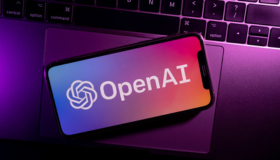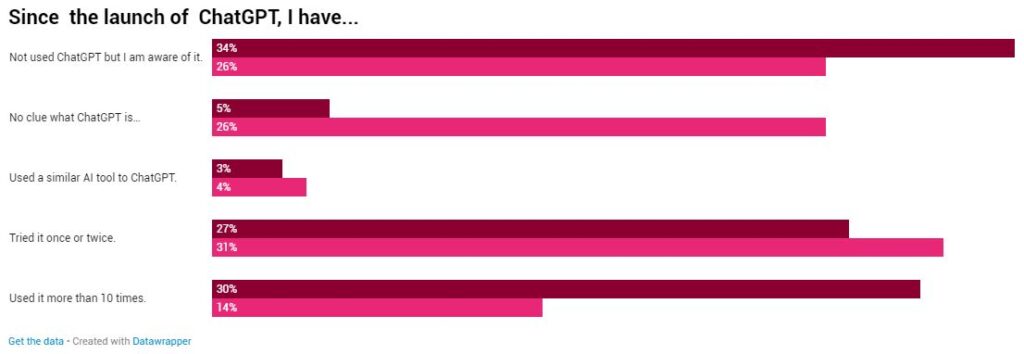Employment survey – Part 3 – AI and ChatGPT

In the third and final employment survey article on The Currency, our Managing Partner Paul McArdle concentrates on the respondents’ attitudes to Artificial Intelligence and ChatGPT.
The Panel ran our Summer Candidate Sentiment Survey in May 2023. The survey was sent to candidates across the accountancy, financial services, HR, banking, treasury, funds, IT, and legal professions.
In our most comprehensive survey to date, we got a total of 3,025 people responding.
As well as answering single-choice and multiple-choice questions, we gave respondents a free text option to comment as they saw fit. The quotes in this article are from the candidates themselves. This is the final article of three in The Currency and concentrates on the respondents’ attitudes to Artificial Intelligence and ChatGPT. Click to access the first and second articles.
*****

Unsurprisingly, twice as many IT professionals are constant users of Chat GPT compared to non-IT respondents. ChatGPT can be used for coding, so we expect a lot of IT candidates to experiment with it for this purpose.
That one in four has only tried ChatGPT once or twice seems low, particularly when only 3 per cent have used an alternative AI product similar to ChatGPT.
One in four of the non-IT respondents had no clue what ChatGPT was compared to one in 20 IT professionals. Again, there is no surprise here.
The awareness levels of ChatGPT are greater among IT respondents, but it is telling that is also high awareness of ChatGPT among the non-IT candidates.
What the respondents said:
“I think AI can be used to save time, but people will get lazy and accept any garbage it generates, polluting the information pool.”
“ChatGPT is in the hype phase. AI will improve things generally but needs to be carefully embraced.”
“I work with cutting-edge technology and ChatGPT is something we will help clients implement so good for me personally in the short run, but I do think the usage of ChatGPT and AI needs to be carefully considered.”

Some 20 percent more IT professionals believe AI will enhance their roles compared to their non-IT counterparts (59 per cent to 49 per cent). The fact that half of the non-IT respondents believe AI will enhance their roles is interesting and seems high.
A third of the IT respondents do not see AI changing their roles, which again seems high and is 20 per cent less than their non-IT counterparts (at 40 per cent).
As for AI having a negative impact on their roles, around one in nine non-IT candidates and only one in 12 IT candidates feel the same way.
What the respondents said:
“I have recently completed a Master’s in AI machine learning. I would not like to work in that area but I believe it was necessary as I do see it as the future in all industries and we will all have to at least know how it all works.”
“AI is the “big unknown”, and my presumption is that, as tech is normally the product of human design, AI may ultimately hit the same ‘humanity’ roadblocks and is unlikely to take over the world. Then again, I thought there was no chance Donald Trump would ever be elected.”
“It truly is a time a great change, learn to change or get left behind.”

There is uniformity in the answers between both groups. The vast majority of people seem to believe their roles will not be replaced by AI in the next three years. This is the most surprising figure in the survey as a) it was uniform across the board and b) the 9 per cent figure seems low.
The survey respondents are knowledge-based workers in the main, it is this type of work that AI is affecting most. For example, Accounts Payable Clerks may find that their work becomes fully automated – this is happening already – and AI will eventually do this type of repetitive work.
The question has a three-year time limit in it; the next time we will ask the same question with a longer timeframe. Maybe that Yes figure will change.
What the respondents said:
“Different outcomes for different people with AI, however, it will complement and not replace. Ever seen AI manage a customer well? Ever seen AI do something innovative and insightful (it plagiarises)? Let AI do mundane tasks that take me away from doing interesting and challenging work!”
“The right people with the right skills will never have any issues in getting paid or finding a career.”

We see some divergence of opinions here, just under half of IT professionals think AI will be good for society, about a third more than their non-IT counterparts.
Interestingly a third of both cohorts believe AI will have a negative societal effect and will be hard to regulate. Only two in ten IT respondents have not thought about the impact of AI, compared to three out of every ten non-It respondents. We expect these figures to be lower the next time we do the survey.
What the respondents said:
“The question on if AI is good or bad for society is too black and white. Given what we have seen with social media I selected the pessimistic view, but there are strong arguments to be made that correctly adopted, controlled and used in a manner which is appropriate, then AI can bring many benefits to some of today’s problems in many sectors.”
“Related to AI – I think it is going beneficial for society but difficult to control as with quite many new technologies.”
“AI will develop, there is no stopping it but the outcome is not good or bad yet, time will tell.”
“While I think AI is great I do think it needs some regulation. There was no option to choose both.”
“I think AI will benefit society and push us on but worry that we will not put the correct structures and compliance in place.”
*****
We would like to thank all the respondents for filling out the survey. Special thanks to those who chose to add their comments; these were particularly illuminating.
This article was initially published on The Currency website.